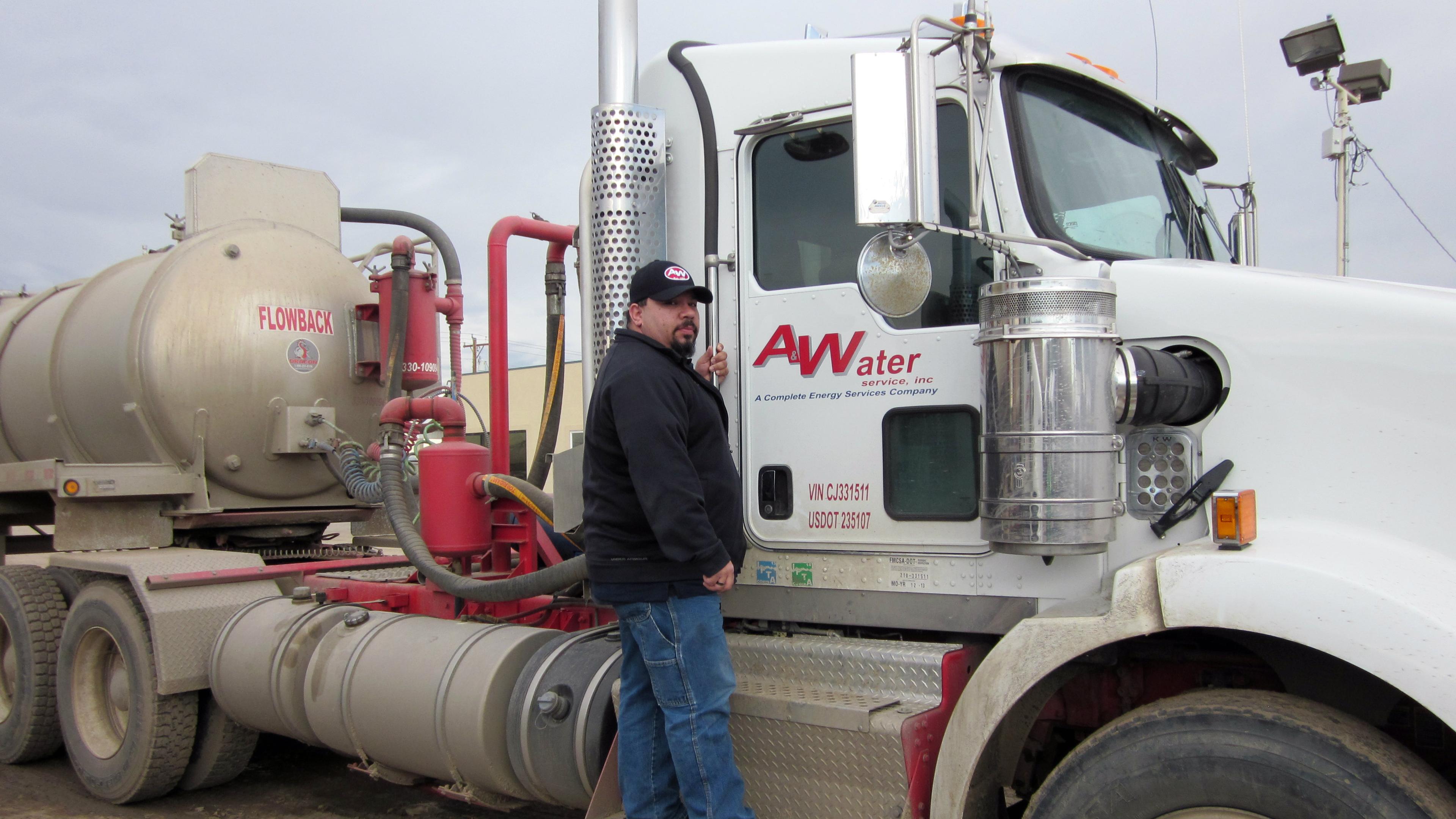
There are more than 50,000 wells in Colorado today and about 32 new wells come online in in the state every week. Fracking requires billions of gallons of water -- much of which is transported by semis.
A recent Boulder County study determined that an average of 1,400 one-way truck trips are required to move the two-to-five million gallons of water used to hydraulically fracture, or frack, a well. Lined up end to end, those trucks would extend more than 17 miles.
1,400 trips x 65 foot semi-truck = 91,000 feet / 5,280 feet = 17.23 miles
A&W Water Service in Fort Lupton, Colo., transports a lot of water through the oil fields -- more than 23,000 gallons a minute, around the clock. The company, a subsidiary of publicly traded Superior Energy Services, is the largest water transport business in the state.
Gary Wright, president of A&W Water, says his family started the company in 1954. Business has ebbed and flowed over the years, he says, but today the company is at an all-time high. Wright says it has tripled in size over the last three years; today it employs 593 people -- and it's still hiring.
Wright says the company’s growth is good for the economy. In the last five years, A &W has spent $50 million dollars on equipment alone. “So that creates jobs for manufacturing, the diesel fuel people that supply our fuel to us, the restaurants that the people go to and eat. Simple as something as work boots,” Wright says.
Ben Montoya, a manager at A & W, started eight years ago making $12.50 an hour as a driver. Now Montonya's earnings are more than three times his original pay. “Our departments have split up and grown exponentially over the years,” he says. “The amount of work that we’ve gotten and the amount of work that we’ve held on to over the years is just incredible.” Today Montoya manages more than 100 drivers.
But trucks are unpopular with many homeowners.
When Weld County resident Travis Conklin bought forty acres east of Platteville in 2007, he used to see about eight to ten vehicles a day driving down the narrow dirt road to his house. Now Conklin says there are more than 400.
"When I first moved out here it was 25 minutes to work,” he says. “Now you can count on at least a 45-minute drive, maybe even longer, depending on traffic, because the semis will have everything backed up.”
Plus, Conklin says his allergies have become insufferable due to diesel fumes and fine dust. He complains that his front yard sounds like an industrial parking lot rather than the quiet ranch he hoped to build.
In a road impact study Boulder County determined that $36,800 was the appropriate fee to charge per well to offset the impact of road damage caused by trucking. But the county has never enacted such a fee.
Rio Blanco County is the only jurisdiction in Colorado that imposes impact fees on oil and gas development. There, the fee ranges from $10,000 to $17,000, depending on the depth of the well.
Travis Conklin stresses that he’s actually a huge fan of drilling. When he was a teenager, he worked in the oil fields as a roustabout. His brother still works as a welder in the oil fields in Wyoming.
“I'm a staunch Conservative Tea Party member," he says. “I believe in drill here, drill now, but I believe in doing it responsibly.”
Conklin is moving to southwest Loveland where he recently bought 1.68 acres of land in search of peace and quiet.
He would like to see the energy companies spend as much money on reducing traffic as they are on drilling.
“If you're going to intrude on people's lives and their livelihoods, you should make it right,” he says. “If you're making billions and billions of dollars, you should spend millions of dollars to make it right for the people that you're taking away from.”
The industry recognizes that people are angry about truck traffic. That’s why A&W Water Service is shifting gears. The company is laying about 30 miles of pipeline through which to move water, in an effort to take trucks off the roads. Other energy companies, including Anadarko Petroleum Corporation, WPX Energy and Noble Energy are also spending millions on pipelines.
Nevertheless, A & W President Gary Wright says as long as there’s oil and gas extraction, semis will keep rolling.
Fracking and Water: The Ripple Effect is an ongoing series and we’d like to hear from you: Send us your thoughts, comments or story ideas to [email protected] or visit our Facebook page for exclusive features.








